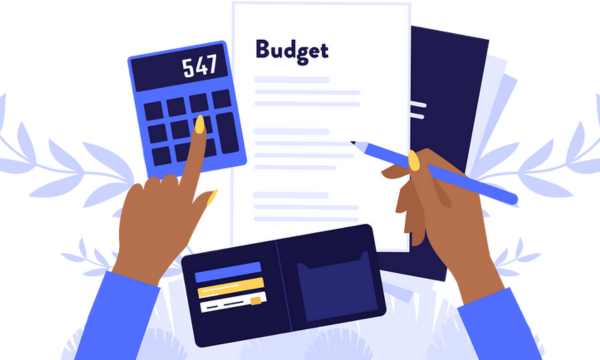Mastering Home Budgeting
Managing your finances effectively is crucial for a stress-free and secure life.
One of the most critical aspects of financial management is keeping track of your household budget. A well-structured home budget can help you achieve your financial goals, reduce debt, and build wealth.
In this article, we discuss the importance of keeping your home budget under control and give you valuable tips to get started.
Why is a Household Budget Important?
A home budget is like the foundation for a strong financial future. It is the process of planning your income and expenses to ensure that you are in control of your financial resources.
Here’s why a family budget is crucial:
- Financial control: Budgeting gives you control over your money. It can help you understand where your income is going and how you can spend it more efficiently. Such controls are the first step towards financial stability.
- Debt Management: A well-structured budget can help you identify areas where you can cut expenses and free up more money to pay off debt. Managing debt is critical to long-term financial health.
- Saving and investing: A budget allows you to spend part of your income on saving and investing. Whether it’s an emergency fund, retirement savings, or investing in stocks and bonds, a budget can help you grow your wealth.
- Goal Achievement: With a budget, setting financial goals like buying a house, taking your dream vacation, or sending your kids to college becomes more attainable. This allows you to plan and save for your goals.
Tips to Keep Your Household Budget Under Control
Now that we understand the importance of a household budget, let’s look at some practical tips to help you get the hang of it:
- Create a detailed budget: Start by listing all your sources of income and all your expenses. Be as detailed as possible. Divide your expenses into essentials (such as rent, utilities, and groceries) and non-essentials (such as dining out and entertainment). This gives you a clear picture of where your money is going.
- Set realistic goals: Determine your short- and long-term financial goals. This could include paying off credit card debt, saving for a vacation, or investing for your retirement. Setting specific, measurable goals will keep you motivated.
- Track your expenses: Use a budgeting app or spreadsheet to track your expenses. This will help you know if you are sticking to your budget and what adjustments you may need to make.
- Check and adjust regularly: Your financial situation may change, so it’s important to check and adjust your budget regularly. This way it remains relevant to your current situation.
- Build an emergency fund: An emergency fund is a financial safety net. Save at least three to six months of living expenses in case of unexpected events such as medical bills or job loss.
- Seek professional help: If you feel overwhelmed by your financial situation or need guidance, contact a financial advisor today. They can give you expert advice based on your specific circumstances.
- Prioritize your expenses: Not all expenses are created equal. Prioritize spending by focusing on needs rather than wants. Make sure basic bills like housing, utilities, and groceries are paid before spending money on non-essentials. This disciplined approach will help you avoid unnecessary debt.
- Reduce unnecessary costs: Identify areas where costs can be reduced. This may mean negotiating a lower interest rate on a loan, cutting back on plans you don’t use, or finding more affordable alternatives for everyday expenses.
- Use cash envelopes: An effective way to keep your expenses under control is to use a cash envelope system. Assign specific amounts of cash to different budget categories and use only that cash for each category. It helps you stay within your budget and avoid overspending.
- Automatic savings: Set up automatic transfers from your checking account to a savings or investment account. Automating savings ensures that you continue to contribute to your financial goals, without having to think about it every month.
- Beware of impulse purchases: Impulse purchases can quickly destroy your budget. Give yourself a cooling-off period before making unnecessary purchases. Ask yourself if it fits your financial goals and if you really need it.
- Involve your family: If you have a family, it is crucial to involve them in the budgeting process. Discuss financial goals and involve everyone in finding ways to save money. Teaching children to budget from a young age can teach them valuable financial skills.
- Stay informed: Stay up to date with financial news and trends. Understanding economic factors can help you make informed decisions about investments and long-term financial planning.
- Be patient: Mastering your household budget is a journey, not a destination. It may take some time before you see significant changes in your financial situation. Stay patient keep trying, and don’t be discouraged by setbacks.
- Celebrate milestones: When you reach a financial milestone, whether it’s paying off a mountain of debt or reaching a savings goal, celebrate your achievement. Positive reinforcement can help you stay motivated and budget effectively.
Conclusion
Remember that mastering a household budget is a skill that can significantly improve your financial situation.
It’s not about depriving yourself, it’s about making conscious choices with your money to achieve your financial goals. By following these tips and sticking to your budget, you’ll be well on your way to financial security and a better future.
FAQs
1. What is a household budget?
A household budget is a financial plan that describes your sources of income and how you plan to spend that income to cover your expenses, savings, and investments. It helps you manage your money efficiently.
2. Why is a budget important?
A budget is important because it provides financial control, helps you manage your debt, save and invest, and allows you to work toward your financial goals. It is an essential tool for achieving financial stability and security.
3. How do I make a budget?
To create a budget, start by listing your sources of income and all your expenses. Divide expenses into essential and non-essential expenses. Use budgeting software or apps to help you track your expenses and create a comprehensive budget.
4. What should I do if my expenses exceed my income?
If your expenses exceed your income, it’s critical to reevaluate your budget. Look for areas where you can cut costs, negotiate better billing deals, or explore opportunities to supplement your income with a side hustle or freelance work.
5. How often should I check my budget?
It is crucial to review your budget regularly. Many experts recommend coming back once a month to track your expenses and make any necessary adjustments. However, you should also review and adjust your budget whenever your financial situation changes.
 Essential Guide to Annual Budget Planning
Essential Guide to Annual Budget Planning
Starting on the path to financial success with the Essential Guide to Annual Budget Planning is the […]
More Mastering Monthly Budget
Mastering Monthly Budget
Learning how to make a monthly budget is a lot like learning how to get around in […]
More Reducing Household Expenses
Reducing Household Expenses
In today’s fast-paced world, managing household expenses has become a major concern for many families. As the […]
More